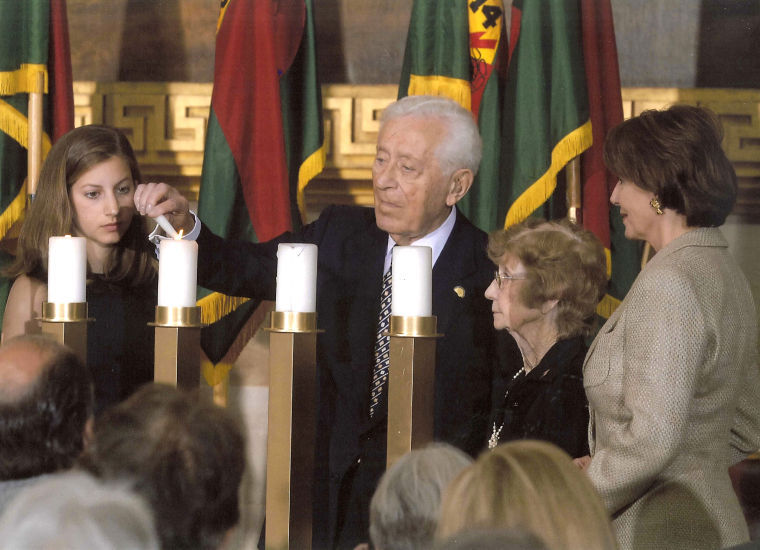William Ungar, a Holocaust survivor, business executive and former president of Temple Israel of Great Neck, died Friday. He was 100.
Ungar, a Polish native who immigrated to the United States after a series of near-miss escapes from death during the Nazi occupation, built a legacy in his adopted home.
Having lost his Polish family to the Holocaust, Ungar married and had children with Jerry Schweitzer, started what would become the biggest private envelope company in the United States and worked to educate Americans about Nazi persecution, helping to found the United States Holocaust Memorial Museum in Washington, D.C.
The horrors of the European genocide tested Ungar’s faith, but it did not break, he told the New York Times in a 1997 interview.
Ungar said he believed his escape had a meaning.
“I figured I survived for two reasons,” Ungar said. “One is to fulfill a certain mission, and second to pay back in some measure the good things people did for me.”
Ungar, who taught at a technical high school before the war, served in a Polish artillery unit on the front lines of the German invasion.
He was wounded in the fighting and captured when the German army gained control of the hospital where he was being treated.
Ungar told sociologist and Holocaust historian William Helmreich that his first capture preceded the full implementation of the Holocaust, and he was released as a wounded veteran.
As the German hold of Poland solidified, Ungar eluded capture by using false documents provided by one of his Catholic students.
His Jewish identity was eventually discovered and he was sent to the Janowska Concentration Camp, from which he escaped.
Ungar made his way to his former apartment building, where he hid from the Nazis in a basement crawl space with the assistance of the building’s Ukrainian landlord.
The Russian army overran the Germans in 1944, but liberation came too late for Ungar’s family. His wife and son, along with dozens of other family members, had died in the Holocaust, leaving Ungar the only European survivor.
Ungar, then 32 years old, took the first boat of refugees to the United States, arriving to greetings from an older brother who he had never met and other members of his family.
He built a life in New York, attending engineering school at City College, where he would later obtain an honorary doctorate, and working days at an envelope machine manufacturing company. He married Jerry in 1950, and the two would have four daughters – Florette, Joan, Denise and Rita.
Ungar started his business in 1951, growing it from three obsolete envelope-making machines to a 200,000 square foot plant in Queens in addition to nationwide operations, according to the interview he gave the New York Times in 1997. At that point the business brought in more than $300 million dollars per year in revenue and produced between 85 million to 90 million envelopes per day, Ungar said.
Along with business success came a dedication to philanthropy and community service.
Ungar served as president of Temple Israel from 1979 to 198, made major contributions to the United States Holocaust Memorial Museum and City College and served on the board of the United Synagogue of Conservative Judaism, among other contributions.
His efforts to promote Holocaust education were recognized in 2005, when he lit a memorial capital in the Capitol Rotunda at an official Holocaust memorial ceremony attended by dignitaries including then-First Lady Laura Bush.
Funeral services were held at Temple Israel on Sunday.
Information provided by Temple Israel public relations official Marc Katz.



